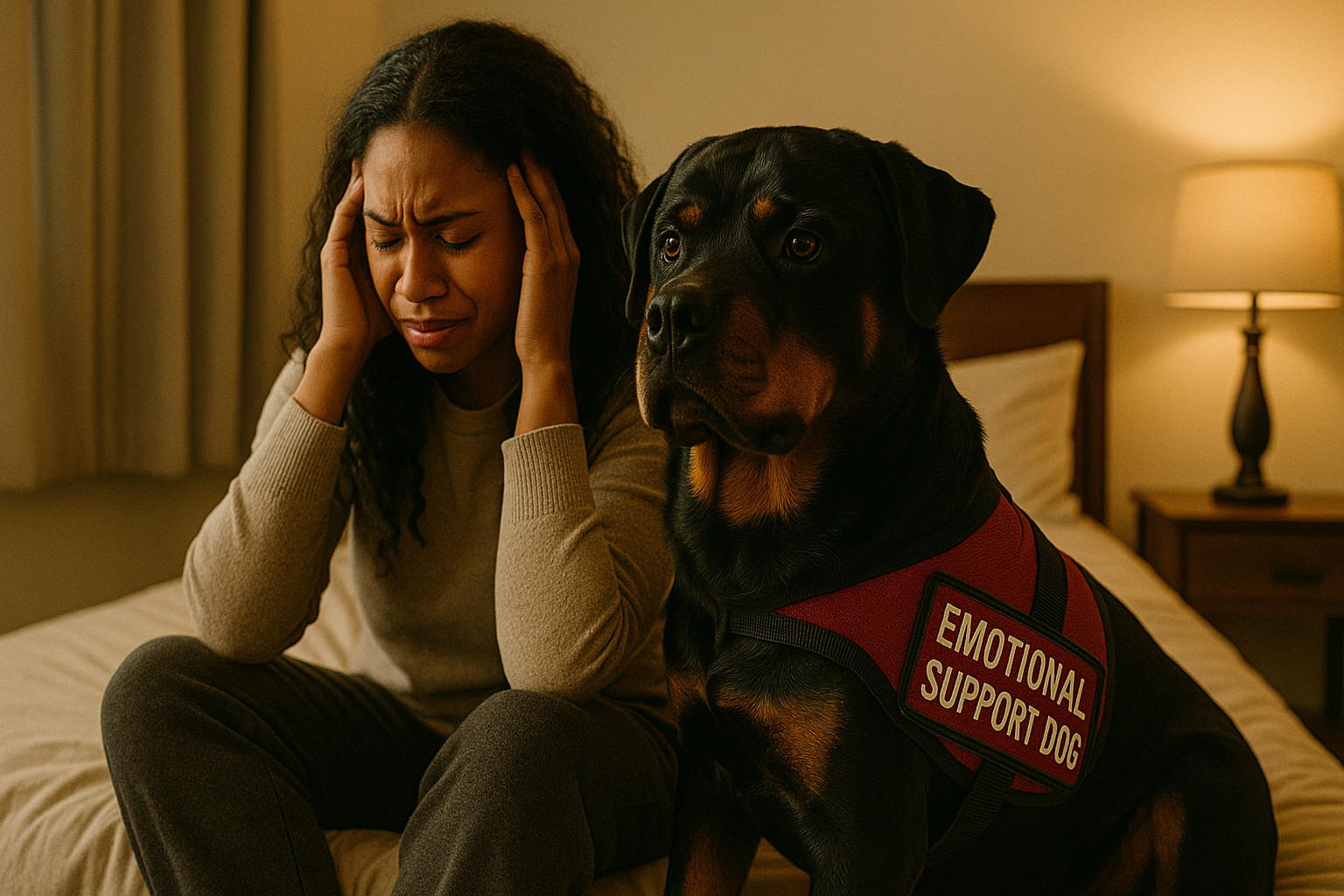Rottweiler as an Emotional Support Dog
Get Your Documents

Rottweilers, historically known for their strength and working capabilities, have also made a place for themselves in the world of emotional support dogs. While they are not traditionally viewed as lap dogs or primary companionship breeds, their unique blend of temperament, loyalty, and sensitivity renders them surprisingly effective in providing emotional support to those in need.
Understanding the Emotional Support Role
Rottweiler Overview
The Rottweiler is a breed that hails originally from Germany, where it was used primarily as a herding dog. Known for their physical prowess, these dogs have a robust muscular build and an innate sense of purpose, embodying both strength and gentility. Despite their imposing exterior, Rottweilers often develop deep emotional bonds with their human companions, which can be leveraged into providing emotional stability and comfort.
Temperament and Emotional Connection
Rottweilers are known for their devotion and protective nature. These qualities translate well when they serve as emotional support animals (ESAs). They possess a keen ability to read human emotions, often responding to their owner’s mood changes with appropriate actions of comfort, such as lying close by or nuzzling. Their serene disposition can be particularly beneficial in helping reduce feelings of anxiety and stress. Unlike highly energetic breeds, Rottweilers tend to acclimate to the energy levels of the household, making them ideal for those seeking calm and stable companionship.
Adaptability and Daily Behavior
One of the quintessential features of a Rottweiler is its adaptability to diverse living situations. Whether it’s a bustling family home or a quiet apartment, these dogs adjust remarkably well to the dynamics at play. While they do require regular exercise to maintain physical health, their energy suffices for long walks or playtime rather than incessant movement. Their amenable nature means that they often act as a calming presence within the home, particularly for individuals who might struggle with loneliness or who require stable, comforting interactions daily.
Situations Where Rottweilers Provide Strong Support
Rottweilers can provide indispensable support in numerous scenarios:
- For individuals with anxiety disorders: Their calming presence and intuitive nature can help ease panic attacks or anxious flare-ups.
- For those dealing with depression: Companionship beyond words, offering a constant emotional anchor through affection and loyalty.
- For children in stressful conditions: Serve as gentle giants who offer security and companionship, helping in alleviating feelings of fear or insecurity.
Ideal Living Environments
These dogs thrive in environments where they can form a close bond with their human counterpart. They acclimate well in family settings with ample attention and affection or in quieter homes where their single owner’s needs dictate a calm and slow-paced lifestyle. They are moderately protective, which suits them well in ensuring a secure environment for individuals requiring emotional support.
Bonds with Different Types of People
The Rottweiler’s strong yearning for companionship makes them suitable for various individuals:
- Elderly individuals: Their calmness and low-maintenance demeanor provide great comfort without overwhelming energy demands.
- Children or teenagers: With proper socialization, Rottweilers can be an ideal source of steadfast support, teaching responsibility and empathy.
- Single adults: Can offer reliable companionship, easing loneliness and providing a consistent emotional presence.
Health, Care, and Wellbeing
Common Health Considerations
Maintaining a Rottweiler’s health is vital for their role as an emotional support dog. Common health issues include hip dysplasia, heart conditions, and obesity. Regular veterinary check-ups, a balanced diet, and adequate exercise are fundamental. A healthy Rottweiler is more capable of offering the emotional stability and comfort they are cherished for.
Grooming, Comfort, and Maintenance Needs
Rottweilers have a short double coat requiring minimal maintenance. Regular grooming routines help keep their coat healthy and offer quality bonding time with owners. Their straightforward grooming needs are advantageous in ensuring that they can continue providing emotional support without the looming concerns of extensive care routines.
Preparing a Rottweiler for Emotional Support Work
Socialization and Responsiveness
Early and consistent socialization is critical. Rottweilers should be exposed to various settings, people, and experiences to prevent overprotectiveness. Through structured training, these dogs can hone their responsiveness to emotional cues, making them more attuned and effective as emotional support animals.
Managing Stress and Emotional Cues
Rottweilers are naturally intuitive, yet they require guidance to manage their stress and interpret emotional cues effectively. Facilitating an environment where they feel secure and recognized for their supportive role enhances their capability to perceive and respond to their human’s needs appropriately. Techniques like positive reinforcement cater to their emotional intelligence, allowing Rottweilers to flourish in their support role.
Strengths, Challenges, and Ideal Homes for Rottweilers
While Rottweilers offer unmatched loyalty and emotional support, prospective owners must weigh these strengths against potential challenges. Embracing their large size and understanding their intrinsic protective instincts is essential when integrating them into homes as emotional support dogs. Families or individuals must remain mindful of instilling proper training and socialization from an early age.
Final Thoughts
Rottweilers possess a unique blend of traits that are often overlooked when considering emotional support animals. Their capacity for empathy, unwavering loyalty, and ability to bond deeply with humans makes them unparalleled companions for individuals in need of emotional stability. Through proper care and nurturing, a Rottweiler can enrich the lives of those they aid, providing comfort, security, and companionship.
Key Takeaways for the Rottweiler as an Emotional Support Dog
- Best suited for: Families, single adults, elderly individuals, those with anxiety or depression.
- Not ideal for: Environments that are without clear boundaries, or for owners unwilling to commit to proper training.
- Emotional traits: Loyalty, protectiveness, empathy, calmness.
- Care and health notes: Require regular exercise, routine vet visits, minimal grooming needs.
- Environments where they provide the most comfort: Family homes, assisted living, quiet apartments with attentive owners.
Get Your Documents
Example State Cards













